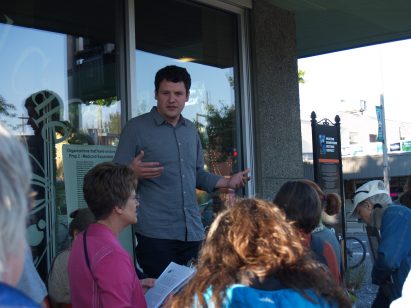A founder of Reclaim Idaho, the group that led the charge to put Medicaid expansion on the November ballot in Idaho, expressed confidence that public support for the measure is growing in his visit to Moscow this week.
“In Boise, and other places around the state, people are asking, ‘Who has the most power — the yes side, or the no side? Which side has more money?’” said Luke Mayville, who helped start the ballot-initiative campaign, at a Monday night gathering in One World Café, “Today we are gratified to have support on both sides of the aisle.”
Volunteers with Reclaim Idaho, along with paid signature-gatherers, cleared both the state’s thresholds. The group painted a 1997 Dodge camper bright green, plastered with “Medicaid for Idaho” across both sides and drove across the state.
“Looking back, I think we made a simple decision at that point,” said Mayville. “We’re not going to go to the people with power, we’re going to the people who have none, we’re going to the people who have a passion.”


Nina Rydalch | Argonaut
The Medicaid expansion initiative, to be called Proposition 2 on the ballot, is one of two that will be on Idaho ballots this November. The other seeks to legalize “historical” horse racing machines in certain places. The two are the first citizen-driven initiatives to qualify for the ballot after the Legislature in 2012 added geographic requirements for petition signatures, on top of the required signatures from six percent of registered voters.
If approved by a simple majority of voters, the initiative would expand access to include all adults under 65 who earn less than 133 percent of the federal poverty limit. Most namely, it would expand access to people who earn too much to qualify for Medicaid and too little to be eligible for subsidies through the state health insurance exchange. The actuarial firm Milliman estimated there are 59,000 so-called “Medicaid gap” population in a state commissioned report released late July.
The gap exists because Idaho, along with 18 other states, has not expanded Medicaid to include a broader range of low-income individuals covered under the Affordable Care Act.
osition will expand healthcare access for life-saving and preventative care and that it will provide benefits.
“You should try to say as often as you can in the same sentence — that this is the compassionate thing to do and the fiscally responsible thing to do,” Mayville said.
Emily Strizich, another leader of the campaign, said expansion could also help uninsured youth.
“I didn’t think about health insurance when I was young,” she said. “I didn’t have health insurance and would wait until a minor cold got much worse, so I could go to the emergency room. It is a very scary reality to be able to get medical care.”
Ellamae Burnell can be reached at [email protected]
